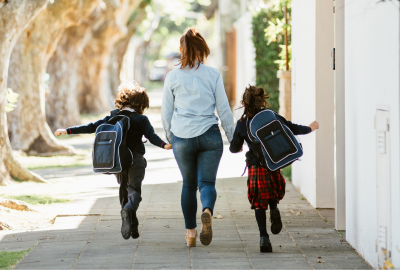Transitioning to Primary School: Four Essential Tips for Parents and Kids
Mary Molloy has dedicated over two decades to the field of childcare and early childhood education. Mary is the founder of Mary's Little Lambs Early Years School in Waterford. With a heartfelt focus on creating nurturing environments, she has led countless little ones through the formative years of their lives. Always proactive, she is an advocate for both parents and children, equipping them with the skills they need to thrive during transitional milestones such as starting primary school.
The first day of primary school is a big event in any child's life—and let's not forget, it's a significant day for parents too! Just as your little one is taking a step toward more independence and learning, you're learning to let go just a tiny bit more. But the shift from pre-school to primary school doesn't have to be fraught with anxiety or tears (from either party!). Over the last 20 years, I've had the pleasure of guiding countless families through this transition. Here are my top tips to make the process smoother for everyone involved.
1. Talk Positively About Starting New School With Your Child
First impressions last, and your attitude can significantly influence how your child perceives this new adventure. Instead of focusing on what they will miss, talk about the exciting opportunities that await. For example, you might say, "You'll get to make so many new friends!" or "I can't wait to hear about all the cool things you're going to learn!"
Remember, children often take cues from their parents. If you're upbeat and positive, there's a good chance they will be too.
2. The Lunchbox Trick
It's surprising how a seemingly simple task like managing a lunchbox can become a stress point for children. To mitigate this, practice giving lunch to your child in their actual lunchbox or bag a few days before school starts. Continue this practice over the weekends during the first weeks of school. This "lunchbox rehearsal" helps them learn how to open and close various containers and packages, and it encourages responsibility in cleaning up after themselves.
3. Self-Sufficiency with Uniforms
While it might be quicker for you to button up their shirts or tie their shoelaces, it's crucial to encourage your child to get dressed independently. This promotes self-reliance and eases morning routines once school begins. Plus, think of the pride your child will feel when they can say, "I did it myself!" So, invest some time in practicing this before the school year starts—it will pay off in the long run.
4. Do a Practice Drive/Walk to School
Familiarity breeds comfort. If the route to the new school is new to your child, consider doing a few practice runs. Whether you'll be driving them to school or they'll be walking, knowing the route in advance can help alleviate first-day jitters. Point out landmarks or fun spots along the way to make the journey more exciting and memorable.
Starting primary school is a significant milestone, but it doesn't have to be a stressful one. With a little preparation, both you and your child can face the first day with excitement rather than apprehension. After all, it's just the beginning of a whole new world of discoveries!
Wishing you and your little ones a happy transition to primary school!
Warm regards,
Mary Molloy
Mary's Little Lambs Early Years School, Waterford
